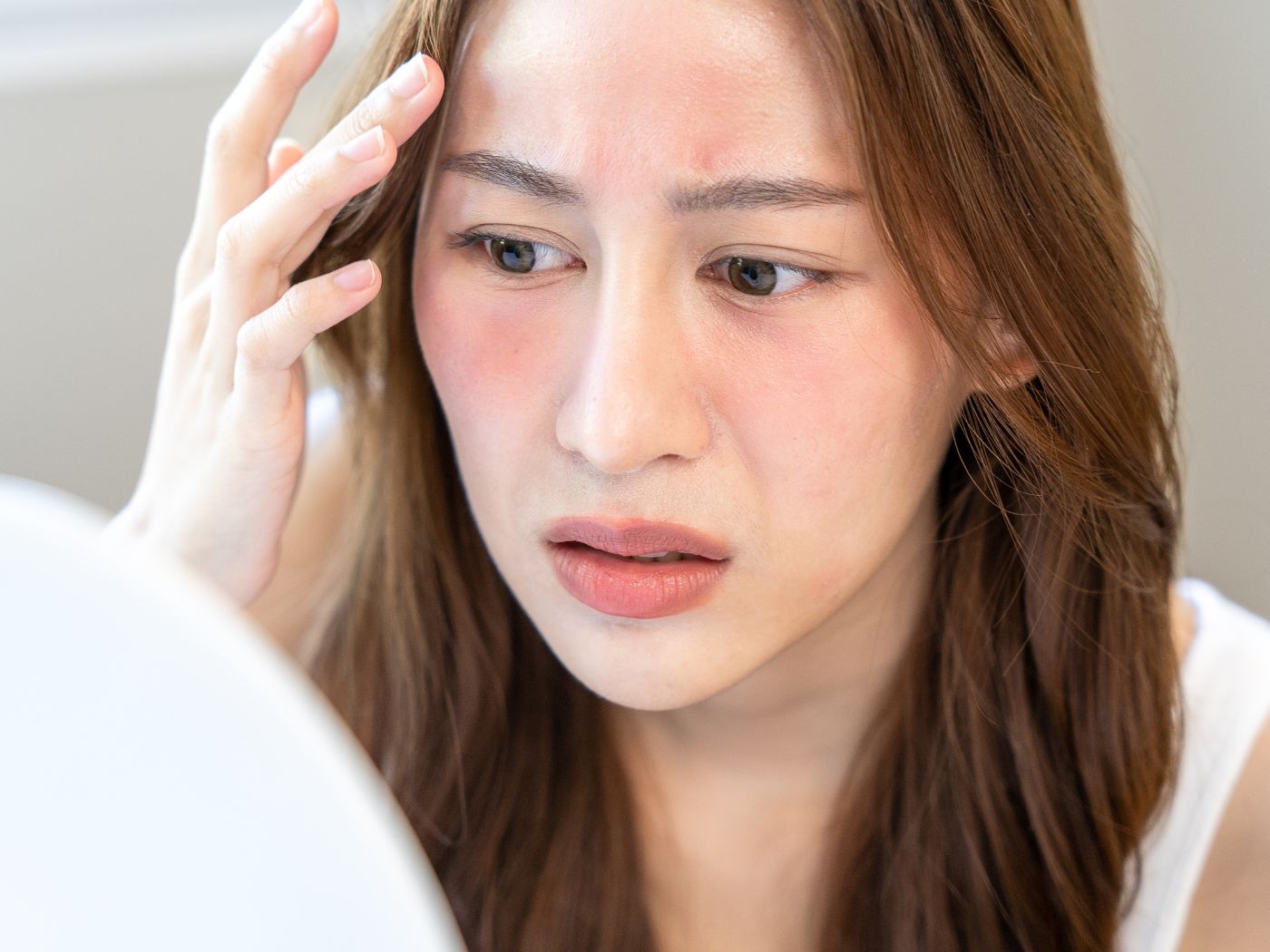There are several skin problems that can be caused due to a variety of reasons. While it is impossible to carefully prevent all of the problems, following a good skincare routine and taking common preventive measures can help. Certain skin problems such as white spots on the skin can be difficult to manage and cause a drop in confidence. However, there are several natural remedies that you can use to treat white spots on your skin! Here is your guide on how to treat white spots!
-
What Are White Spots On Skin and Their Causes?
-
5 Home Remedies for White Spots On Skin
-
Conclusion
-
FAQs On Natural Remedies For White Spots On Skin
What Are White Spots On Skin and Their Causes?

White spots on the skin are areas of skin that are lighter in colour than the surrounding skin. These spots can vary in size and may be raised or flat. White spots on the skin can be caused by a variety of factors, including:
- Fungal infections: Fungal infections such as tinea versicolor can cause white or light-coloured spots on the skin.
- Vitiligo: Vitiligo is a skin condition in which the cells that produce skin pigment are destroyed, resulting in patches of white skin.
- Pityriasis alba: Pityriasis alba is a common skin condition that causes light-coloured patches on the skin, usually on the face.
- Sun damage: Sun damage can cause white spots on the skin, particularly in areas that are frequently exposed to the sun.
- Eczema: Eczema can cause dry, scaly patches on the skin that may appear white or lighter than the surrounding skin.
- Psoriasis: Psoriasis is a chronic autoimmune condition that can cause red, scaly patches of skin that may appear white or silver.
- Idiopathic guttate hypomelanosis: This is a condition characterized by small, white spots on the skin, typically on the legs and arms, and is more common in individuals over the age of 40.
It's important to see a dermatologist if you develop white spots on your skin, as they can help diagnose the underlying cause and recommend the appropriate treatment.
5 Home Remedies for White Spots On Skin

While home remedies may not work for everyone, here are some additional details about the remedies mentioned:
- Coconut oil: Coconut oil contains medium-chain fatty acids that have been shown to have anti-inflammatory and antimicrobial properties. These properties may help reduce inflammation and fight off any potential infections that could be causing white spots on the skin. To use, apply a small amount of coconut oil to the affected area and massage gently.
- Aloe vera: Aloe vera has been used for centuries to soothe and heal the skin. It contains compounds that have anti-inflammatory and antimicrobial properties, which can help reduce inflammation and fight off any potential infections. To use, apply a small amount of aloe vera gel to the affected area and massage gently.
You can also try Pure Sense Nourishing Sheet Mask with aloe vera and cucumber to help treat dark and white spots, gently hydrate and nourish your skin, and protect it from further damage!
- Turmeric: Turmeric contains a compound called curcumin, which has potent anti-inflammatory and antioxidant properties. These properties can help improve skin health and reduce the appearance of white spots. To use, mix turmeric powder with water to create a paste, and apply it to the affected area. Leave on for 10-15 minutes before rinsing off with warm water.
- Apple cider vinegar: Apple cider vinegar has been shown to have antifungal properties that can help treat fungal infections that may be causing white spots on the skin. To use, dilute apple cider vinegar with water in a 1:1 ratio and apply it to the affected area using a cotton ball. Leave on for a few minutes before rinsing off with warm water.
- Vitamin E: Vitamin E is an antioxidant that can help protect the skin from damage and promote healing. It can also help reduce the appearance of white spots. To use, apply vitamin E oil to the affected area and massage gently.
It's important to note that these remedies may not be effective for all cases of white spots on the skin, and it's important to consult with a dermatologist for a proper diagnosis and treatment plan. Additionally, some home remedies may not be safe for certain skin types or may cause allergic reactions, so it's important to test on a small area of skin before applying them to larger areas. You can also try these alternative tips for how to treat white spots.
The treatment for white spots on the skin depends on the underlying cause. Here are some common treatments for different types of white spots:
Sure, here are some more details on the treatments for white spots on the skin:

- Fungal infections: If the white spots are caused by a fungal infection, a dermatologist may prescribe antifungal creams, ointments, or oral medications to eliminate the infection. Topical antifungal creams or ointments are usually applied to the affected area for several weeks, while oral medications may be taken for several months.
- Vitiligo: Vitiligo is a chronic condition that cannot be cured, but there are treatments available that may help improve the appearance of the skin. Topical corticosteroids are often the first-line treatment for vitiligo, as they can help to reduce inflammation and slow the progression of the disease. Calcineurin inhibitors, such as tacrolimus and pimecrolimus, may also be used to treat vitiligo, as they can help to reduce inflammation and stimulate repigmentation. Light therapy, such as UVB phototherapy, may also be used to treat vitiligo.
- Sun damage: If the white spots are caused by sun damage, it is important to protect the skin from further damage by wearing protective clothing, such as long-sleeved shirts and hats, using a broad-spectrum sunscreen with an SPF of 30 or higher, and avoiding excessive sun exposure. In some cases, cosmetic treatments such as chemical peels or laser therapy may also be used to improve the appearance of the skin.
- Eczema and psoriasis: Eczema and psoriasis are chronic skin conditions that may cause white spots on the skin. Treatment usually involves topical creams and ointments, as well as oral medications in severe cases. Topical corticosteroids, such as hydrocortisone, may be used to reduce inflammation and itching, while calcineurin inhibitors, such as tacrolimus and pimecrolimus, may be used to reduce inflammation and help prevent flare-ups.
- Idiopathic guttate hypomelanosis: Treatment is usually not necessary for this condition, but cosmetic treatments such as laser therapy or chemical peels may help improve the appearance of white spots. In some cases, topical creams or ointments containing retinoids may also be used to stimulate skin cell turnover and reduce the appearance of white spots.
Conclusion
We hope now you know everything you need to know about white spots on your skin and how to treat them! Remember to consult a dermatologist before trying any new method of treatment to avoid any complications!
FAQs On Natural Remedies For White Spots On Skin
-
Do white spots spread?
Whether or not white spots on the skin spread depends on the underlying cause. Fungal infections can spread if untreated, while vitiligo can cause the white patches to become larger and more numerous. White spots caused by sun damage typically do not spread, but new spots can develop with further sun exposure. Eczema and psoriasis usually do not cause white spots to spread, but they can cause inflammation and redness in other areas. Idiopathic guttate hypomelanosis does not spread and is not contagious. I
-
Which vitamin is good for white spots on the skin?
Vitamin B12 and vitamin D have been found to be beneficial for treating some types of white spots on the skin. However, it's important to consult a dermatologist for a proper diagnosis and treatment plan, as the underlying cause of the white spots may require other forms of treatment. Additionally, taking high doses of vitamins without medical supervision can be dangerous, so it's important to follow the recommended dosage and frequency of any vitamin supplements.
-
Which food is good for white patches?
There is no specific food that has been proven to treat white patches on the skin. However, consuming a well-balanced diet that includes a variety of fruits, vegetables, whole grains, lean protein, and healthy fats can help support overall skin health. Some research suggests that antioxidants found in certain foods, such as berries and green leafy vegetables, may help protect the skin from sun damage and other environmental stressors that can contribute to the development of white patches.







